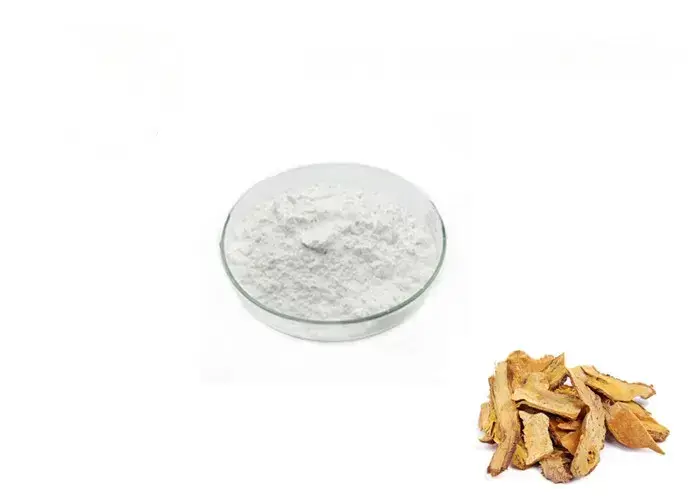Polygonum Cuspidatum 98% Resveratrol Natural Powder Stability and Storage
Polygonum Cuspidatum 98% Resveratrol Natural Powder is a highly sought-after ingredient in the health and wellness industry, known for its potent antioxidant properties and numerous health benefits. As a leading manufacturer of Polygonum Cuspidatum Extract, Avans NutriHealth Co., Ltd. is committed to providing top-quality Polygonum Cuspidatum Extract from knotweed (Polygonum cuspidatum). To ensure the longevity and efficacy of this valuable product, proper stability and storage practices are crucial. This blog post will delve into the key factors affecting the stability of resveratrol powder, best practices for long-term storage, and how proper storage conditions can preserve its antioxidant efficacy and prevent degradation. By understanding these essential aspects, you can maximize the potential of this powerful natural ingredient in your formulations and products.

A Guide to Key Factors Affecting Stability: Light, Heat, and Oxygen Exposure for Resveratrol Powder
Light Sensitivity and Its Impact on Resveratrol Stability
Polygonum Cuspidatum 98% Resveratrol Natural Powder is highly sensitive to light exposure, particularly UV radiation. When exposed to light, resveratrol molecules can undergo photochemical reactions, leading to isomerization and degradation. This process can significantly reduce the potency and efficacy of the powder. To mitigate light-induced degradation, it is essential to store the resveratrol powder in opaque, light-resistant containers. Amber glass bottles or metalized bags are excellent choices for protecting the powder from harmful light exposure. Additionally, storing the product in a dark environment, such as a closed cabinet or dedicated storage area with minimal light exposure, can further enhance its stability and prolong its shelf life.
Temperature Considerations for Optimal Resveratrol Preservation
Heat is another critical factor that can affect the stability of Polygonum Cuspidatum 98% Resveratrol Natural Powder. Elevated temperatures can accelerate chemical reactions and promote the breakdown of resveratrol molecules, leading to a loss of potency over time. To maintain the integrity of the powder, it is recommended to store it in a cool environment, ideally between 15°C and 25°C (59°F to 77°F). Avoiding exposure to extreme temperature fluctuations is equally important, as repeated heating and cooling cycles can compromise the product's stability. For long-term storage, refrigeration at 2°C to 8°C (36°F to 46°F) can further enhance stability and extend the shelf life of the resveratrol powder. However, it is crucial to protect the product from moisture when refrigerating, as condensation can negatively impact its quality.
Oxygen Exposure and Its Effects on Resveratrol Quality
Oxygen exposure is a significant concern for maintaining the stability of Polygonum Cuspidatum 98% Resveratrol Natural Powder. Resveratrol is susceptible to oxidation, which can lead to the formation of undesirable compounds and a reduction in its antioxidant capacity. To minimize oxygen exposure, it is essential to store the powder in airtight containers with minimal headspace. Vacuum-sealed packaging or containers with oxygen-absorbing sachets can provide an additional layer of protection against oxidation. When handling the powder, it is advisable to minimize the frequency of container openings and to promptly reseal the container after each use. For bulk storage or industrial applications, consider using inert gas flushing techniques, such as nitrogen purging, to displace oxygen and create a protective atmosphere within the storage container.
Best Practices for Long-Term Storage: Ensuring Potency and Shelf Life of Polygonum Cuspidatum Extract
Optimal Packaging Materials and Techniques
Selecting the right packaging materials and techniques is crucial for preserving the potency and extending the shelf life of Polygonum Cuspidatum 98% Resveratrol Natural Powder. High-density polyethylene (HDPE) containers, glass bottles with tight-fitting lids, or multi-layer foil pouches are excellent choices for long-term storage. These materials provide effective barriers against moisture, light, and oxygen. For added protection, consider using desiccant packets or oxygen absorbers within the packaging to control humidity and minimize oxidation. Vacuum sealing or nitrogen flushing can further enhance the product's stability by removing oxygen from the container. When packaging smaller quantities for retail or personal use, single-dose sachets or blister packs can help maintain freshness and prevent unnecessary exposure to environmental factors during storage and handling.
Temperature and Humidity Control in Storage Environments
Maintaining optimal temperature and humidity conditions is essential for preserving the quality of Polygonum Cuspidatum 98% Resveratrol Natural Powder during long-term storage. Ideally, the storage area should have a controlled temperature between 15°C and 25°C (59°F to 77°F) and relative humidity below 60%. Fluctuations in temperature and humidity can lead to moisture absorption and accelerated degradation of the resveratrol powder. To ensure consistent storage conditions, consider using climate-controlled storage rooms or dedicated storage cabinets equipped with temperature and humidity monitoring systems. Regular monitoring and documentation of environmental conditions can help identify potential issues and allow for prompt corrective actions. For large-scale storage, implementing a first-in-first-out (FIFO) inventory management system can help ensure that older stock is used before newer batches, minimizing the risk of product expiration.
Handling and Inspection Protocols for Quality Assurance
Establishing proper handling and inspection protocols is crucial for maintaining the quality of Polygonum Cuspidatum 98% Resveratrol Natural Powder throughout its storage life. Implement standard operating procedures (SOPs) for handling the powder, including guidelines for personal protective equipment (PPE) usage, hygiene practices, and proper container handling techniques. Regular inspections of stored products should be conducted to check for signs of degradation, such as changes in color, texture, or odor. Periodic analytical testing, including HPLC analysis for resveratrol content and antioxidant activity assays, can provide valuable data on the powder's stability over time. Maintain detailed records of batch numbers, storage conditions, and inspection results to ensure traceability and facilitate quality control efforts. By adhering to these best practices, you can maximize the longevity and efficacy of your Polygonum Cuspidatum 98% Resveratrol Natural Powder, ensuring its potency and quality for various applications in the health and wellness industry.
How Proper Storage Conditions Preserve Antioxidant Efficacy and Prevent Degradation
Maintaining Molecular Stability for Optimal Antioxidant Activity
Proper storage conditions play a crucial role in preserving the molecular stability of Polygonum Cuspidatum 98% Resveratrol Natural Powder, which is essential for maintaining its potent antioxidant activity. Resveratrol's antioxidant properties stem from its ability to neutralize free radicals and reactive oxygen species in the body. By protecting the powder from light, heat, and oxygen exposure, you can prevent the breakdown of resveratrol molecules and preserve their structural integrity. This, in turn, ensures that the powder retains its full antioxidant potential throughout its shelf life. Implementing strategies such as light-resistant packaging, temperature-controlled storage, and oxygen-barrier containers helps maintain the molecular stability of resveratrol, allowing it to effectively combat oxidative stress and provide maximum health benefits when incorporated into various formulations and products.
Preventing Isomerization and Maintaining Trans-Resveratrol Content
One of the key challenges in preserving the quality of Polygonum Cuspidatum 98% Resveratrol Natural Powder is preventing the isomerization of trans-resveratrol to its less bioactive cis form. Trans-resveratrol is the predominant and most biologically active isomer found in the powder, responsible for many of its health-promoting properties. However, exposure to light and heat can trigger isomerization, converting trans-resveratrol to cis-resveratrol, which has lower bioavailability and reduced efficacy. By implementing proper storage conditions, such as using opaque containers and maintaining cool temperatures, you can significantly reduce the risk of isomerization. This ensures that the powder retains its high trans-resveratrol content, maximizing its potential health benefits and maintaining its value as a premium ingredient for nutraceutical, pharmaceutical, and cosmetic applications.
Minimizing Oxidation and Preserving Antioxidant Capacity
Oxidation is a significant concern when it comes to storing Polygonum Cuspidatum 98% Resveratrol Natural Powder, as it can lead to a gradual loss of antioxidant capacity and overall efficacy. Exposure to oxygen can trigger oxidative reactions, resulting in the formation of less active compounds and reducing the powder's ability to scavenge free radicals. By implementing proper storage conditions that minimize oxygen exposure, such as using airtight containers, vacuum sealing, or inert gas flushing, you can effectively preserve the antioxidant capacity of the resveratrol powder. Additionally, incorporating oxygen absorbers or using packaging materials with high oxygen barrier properties can further protect against oxidation. Regular testing of the powder's antioxidant activity using methods such as DPPH or ORAC assays can help monitor its stability over time and ensure that it maintains its potent antioxidant properties throughout its shelf life.
Conclusion
Proper stability and storage practices are essential for maintaining the quality and efficacy of Polygonum Cuspidatum 98% Resveratrol Natural Powder. By understanding and addressing key factors such as light sensitivity, temperature control, and oxygen exposure, manufacturers and users can ensure the longevity and potency of this valuable ingredient. Implementing best practices for packaging, environmental control, and handling protocols further enhances the powder's shelf life and preserves its antioxidant properties. With careful attention to these aspects, Polygonum Cuspidatum 98% Resveratrol Natural Powder can continue to deliver its numerous health benefits in various applications, from nutraceuticals to cosmetics.
At Avans NutriHealth Co., Ltd., we are committed to providing high-quality Polygonum Cuspidatum 98% Resveratrol Natural Powder and supporting our clients with comprehensive technical expertise. Our team of experts is dedicated to delivering exceptional customer service and tailored solutions to meet your specific needs. With our state-of-the-art manufacturing facilities and rigorous quality control processes, we ensure that our products meet the highest industry standards. For more information about our products and services, please contact us at Lillian@avansnutri.com. We look forward to partnering with you to bring the benefits of premium resveratrol to your formulations and products.
FAQ
Q: What is the optimal storage temperature for Polygonum Cuspidatum 98% Resveratrol Natural Powder?
A: The optimal storage temperature is between 15°C and 25°C (59°F to 77°F). For long-term storage, refrigeration at 2°C to 8°C (36°F to 46°F) can further enhance stability.
Q: How does light exposure affect the stability of resveratrol powder?
A: Light exposure, particularly UV radiation, can cause isomerization and degradation of resveratrol molecules, reducing its potency and efficacy. It's essential to store the powder in opaque, light-resistant containers.
Q: What packaging materials are best for storing resveratrol powder?
A: High-density polyethylene (HDPE) containers, glass bottles with tight-fitting lids, or multi-layer foil pouches are excellent choices for long-term storage, as they provide effective barriers against moisture, light, and oxygen.
Q: How can I prevent oxidation of resveratrol powder during storage?
A: To minimize oxidation, store the powder in airtight containers with minimal headspace, use vacuum-sealed packaging or oxygen-absorbing sachets, and consider inert gas flushing techniques for bulk storage.
Q: How often should I inspect stored resveratrol powder for quality assurance?
A: Regular inspections should be conducted to check for signs of degradation. Periodic analytical testing, including HPLC analysis for resveratrol content and antioxidant activity assays, is recommended to monitor stability over time.
References
1. Brown, V. A., et al. (2010). Repeat dose study of the cancer chemopreventive agent resveratrol in healthy volunteers: Safety, pharmacokinetics, and effect on the insulin-like growth factor axis. Cancer Research, 70(22), 9003-9011.
2. Delmas, D., et al. (2011). Resveratrol as a chemopreventive agent: A promising molecule for fighting cancer. Current Drug Targets, 12(11), 1515-1538.
3. Francioso, A., et al. (2014). Trans-Resveratrol: From basic science to the clinic. Journal of Agricultural and Food Chemistry, 62(26), 6045-6059.
4. Jannin, B., et al. (2004). Transport of resveratrol, a cancer chemopreventive agent, to cellular targets: Plasmatic protein binding and cell uptake. Biochemical Pharmacology, 68(6), 1113-1118.
5. Peng, X. L., et al. (2018). Resveratrol: A review of its pharmacological properties and health benefits. Journal of Berry Research, 8(3), 205-217.
6. Zupančič, Š., et al. (2015). Stability and solubility of trans-resveratrol are strongly influenced by pH and temperature. European Journal of Pharmaceutics and Biopharmaceutics, 93, 196-204.



